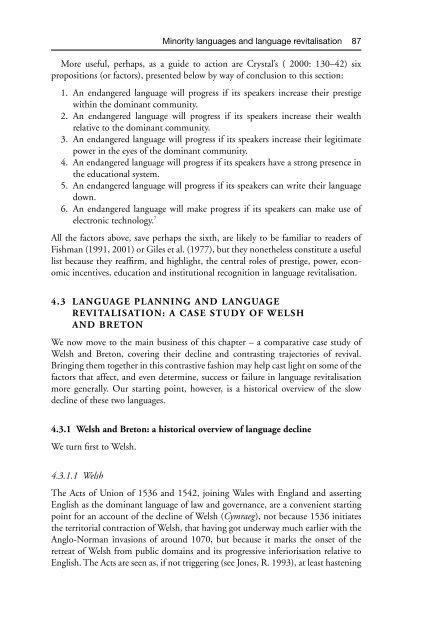Gibson Ferguson Language Planning and Education Edinburgh ...
Gibson Ferguson Language Planning and Education Edinburgh ...
Gibson Ferguson Language Planning and Education Edinburgh ...
You also want an ePaper? Increase the reach of your titles
YUMPU automatically turns print PDFs into web optimized ePapers that Google loves.
Minority languages <strong>and</strong> language revitalisation 87<br />
More useful, perhaps, as a guide to action are Crystal’s ( 2000: 130–42) six<br />
propositions (or factors), presented below by way of conclusion to this section:<br />
1. An endangered language will progress if its speakers increase their prestige<br />
within the dominant community.<br />
2. An endangered language will progress if its speakers increase their wealth<br />
relative to the dominant community.<br />
3. An endangered language will progress if its speakers increase their legitimate<br />
power in the eyes of the dominant community.<br />
4. An endangered language will progress if its speakers have a strong presence in<br />
the educational system.<br />
5. An endangered language will progress if its speakers can write their language<br />
down.<br />
6. An endangered language will make progress if its speakers can make use of<br />
electronic technology. 7<br />
All the factors above, save perhaps the sixth, are likely to be familiar to readers of<br />
Fishman (1991, 2001) or Giles et al. (1977), but they nonetheless constitute a useful<br />
list because they reaffirm, <strong>and</strong> highlight, the central roles of prestige, power, economic<br />
incentives, education <strong>and</strong> institutional recognition in language revitalisation.<br />
4.3 LANGUAGE PLANNING AND LANGUAGE<br />
REVITALISATION: A CASE STUDY OF WELSH<br />
AND BRETON<br />
We now move to the main business of this chapter – a comparative case study of<br />
Welsh <strong>and</strong> Breton, covering their decline <strong>and</strong> contrasting trajectories of revival.<br />
Bringing them together in this contrastive fashion may help cast light on some of the<br />
factors that affect, <strong>and</strong> even determine, success or failure in language revitalisation<br />
more generally. Our starting point, however, is a historical overview of the slow<br />
decline of these two languages.<br />
4.3.1 Welsh <strong>and</strong> Breton: a historical overview of language decline<br />
We turn first to Welsh.<br />
4.3.1.1 Welsh<br />
The Acts of Union of 1536 <strong>and</strong> 1542, joining Wales with Engl<strong>and</strong> <strong>and</strong> asserting<br />
English as the dominant language of law <strong>and</strong> governance, are a convenient starting<br />
point for an account of the decline of Welsh (Cymraeg), not because 1536 initiates<br />
the territorial contraction of Welsh, that having got underway much earlier with the<br />
Anglo-Norman invasions of around 1070, but because it marks the onset of the<br />
retreat of Welsh from public domains <strong>and</strong> its progressive inferiorisation relative to<br />
English. The Acts are seen as, if not triggering (see Jones, R. 1993), at least hastening






